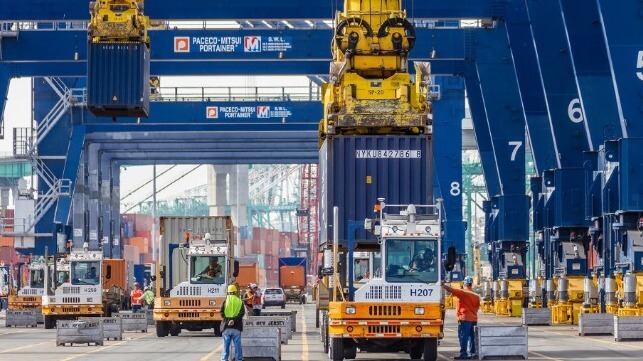U.S. Container Import Volumes Soar Prompting Retailers to Increase Forecast

Despite all the challenges being reported for container shipping and the negative outlook presented by the carriers, U.S. import container volumes are soaring and expected to continue their upward momentum through at least the first half of 2024. This comes as economists continue to point to the resiliency of the economy and the apparent soft landing to the feared 2023 recession.
U.S. container import volume had its largest month-over-month gain in January 2024 in the last seven years according to data released by Descartes Systems Group, a software provider for logistics-intensive businesses. Their February Global Shipping report highlights a 7.9 percent increase in overall container import volume in the U.S. in January 2024 versus December. They report a nearly 15 percent rise in imports from China, highlighting that most of the volume went to the ports of Los Angeles and Long Beach.
The strong growth in January 2024 also brought container volumes back up to year-ago levels and even slightly ahead of January 2019 before the pandemic. Descartes calculates volumes were up nearly 10 percent year-over-year to a total of 2.27 million TEU in January 2024. This is also 9.6 percent ahead of January 2019.
“January was another solid month driven by surprisingly strong imports from China,” said Chris Jones, EVP Industry and Services, Descartes. He however warns, “The combined effect of the Panama drought and the conflict in the Middle East is beginning to impact transit times, particularly at the top East and Gulf coast ports.”
Descartes cautions that the global supply chain performance could be impacted throughout 2024. They highlight the ongoing limits of transits at the Panama Canal, the disruptions to routes through the Red Sea and Suez Canal, and the upcoming labor negotiations at U.S. Atlantic and Gulf Coast ports. The International Longshoremen Association reported it has given its locals a May 2024 deadline as it works to complete a master contract before the September 30, 2024, expiration.
The National Retail Federation, the trade group for U.S. retailers, is also predicting a strong start to 2024 with a forecast of a better than five percent increase in import container volumes for the first half of 2024 versus 2023. Their Global Port Tracker is forecasting a strong gain of 20 percent for February in part due to the timing of the Lunar New Year in 2023 and the beginning of a slowdown in import volumes a year ago.
“U.S. retailers are working to mitigate the impact of delays and increased costs,” says Jonathan Gold, NRF Vice President for Supply Chain and Customs Policy, discussing the ramifications of the Suez Canal and Red Sea disruptions. He highlights that only about 12 percent of U.S.-bound cargo comes through the Suez Canal,” but warns like others, “the longer the disruptions occur, the bigger impact this could have.”
After a strong February, the NRF predicts volumes will be up at a more moderate pace in the first half of the year. They forecast between 2.65 percent and 5.5 percent gains with only May expected to be flat with the year-ago. Monthly retail import volumes are projected at between 1.7 and 1.9 million TEU per month.
No comments:
Post a Comment